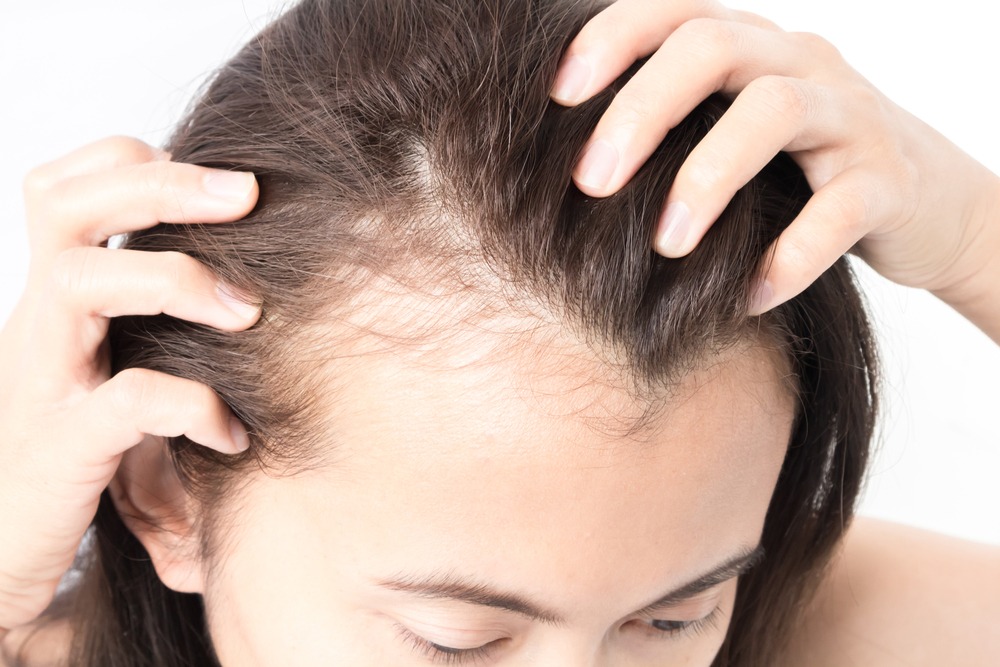In this article:
What is Postpartum Hair Loss?
Cause of Postpartum Hair Loss
Remedies for Postpartum Hair Loss
What is Postpartum Hair Loss?
Hair loss often follows childbirth in the postpartum period without causing baldness. In this situation, the hair is actually thicker during pregnancy due to increased circulating oestrogens. Approximately three months after giving birth, oestrogen levels drop and hair loss occurs, often particularly noticeably around the hairline and temple area. Hair typically grows back normally and treatment is not indicated. During this postpartum hair loss phase, the hair could fall out in clumps either while brushing it or in the shower. Though it is common for hair to fall out from all areas of the head, many women may notice hair loss around their hairline resulting in the appearance of a very fine hair in the front.
Read More:11 Essential Oils for Hair Loss
Things You Should Know about Postpartum Hair Loss
Cause of Postpartum Hair Loss
During pregnancy, high levels of oestrogen prevents the usual rate of hair loss and the hair loss decreases. However after the baby arrives and the hormone levels drop, the hair makes up for the lost time by falling out in bigger clumps than normal. The total volume of hair loss is not much more, it seems more as it happens all at once.
Breastfeeding is often blamed for hair loss although there is no evidence to show it as correct. This is a symptom that almost all moms will experience. It can become extreme (called postpartum alopecia). It can last a few weeks or a few months depending on how long the hair cycles last.
During pregnancy the hair looks fuller and more vibrant due to the consumption of prenatal vitamins which helps it to look best. Often when you are pregnant the hair goes into a dormant cycle and falls less. This is called the telogen phase. It eventually goes into the telogen effluvium phase and falls off. The hair loss and growth will probably be most apparent in the area above the forehead. Gaining a lot of hair during pregnancy and losing it later may look quite dramatic.
Read More:8 Must Know Causes for Hair Loss in Children
Remedies for Postpartum Hair Loss
Maintain a Healthy Diet
A healthy diet including necessary balance of vitamins and nutrients found primarily in vegetables, whole grains and fresh fruits.
Take Nutritional Supplement
The American Pregnancy Association recommends the following vitamins and mineral supplements to help stop hair loss and promote hair regrowth.
Vitamin B complex, iron, vitamin C, vitamin E, zinc.
Reduce Stress
Practice different relaxation techniques like mindfulness, meditation or breathing exercises. Postpartum hair loss though stressful is a completely normal symptom of the changing hormones after birth. Gentle or moderate exercise can also help to reduce stress.
Change your Hairstyle
Regardless of the length of the hair, adjust your hairstyle to reduce the amount of stress put on the hair. Limit vigorous brushing to avoid tearing or splitting the hair and avoid pulling hair into ponytails, braids or weaves.
Read More:11 Things To Do For Baby Hair Growth
Modify Hair Care Routine
Try using postpartum hair loss shampoo that is rich in biotin and silica and a deep moisture conditioner. Avoid using hot rollers and straightening irons to prevent further damage that can be caused by excessive heat. Hair masks and sprays recommended by dermatologist can also be used.
Go Natural
Avoid colouring your hair and using harsh gels and sprays for styling. Opt for the natural home made hair oils instead to strengthen hair growth. Volumizing shampoos may add body to your hair and make it look lustrous.
Fish Oil
Essential fatty acids such as Omega 3 help to make the brittle hair shinier as well as promote the growth of new strong hair.
DIY Hair Mask
Healthy hair growth needs a healthy scalp which in turn needs enough moisture. Mix 2 egg yolks with ¼ cup coconut oil and 4 tablespoon mashed avocado and apply on the scalp. Let it sit for an hour and wash it off.
Scalp Massage
Massaging the scalp can stimulate the hair follicles and promote further and quicker hair growth. Almond oil or almond based oil is good for scalp massages. The rich monounsaturated fatty acids, polyunsaturated fatty acids and vitamin E are necessary for a healthy hair. It not only prevents hair loss but also makes the hair shiny and healthier from the outside.
Biotin and Postpartum Hair Loss
It is a great supplement that fuels hair skin and nail growth. It is a vitamin B complex and found in many items such as carrots, liver, yeast, bananas, in low concentration. Biotin is especially important to keep the hair healthy post pregnancy because it functions in the synthesis of hair products like keratin. The daily recommended amount of biotin for non breastfeeding mothers is 30 mcg per day and for breastfeeding mothers is 35 mcg per day. Trying shampoos that are fortified with biotin may also promote stronger and healthier hair. [1]
